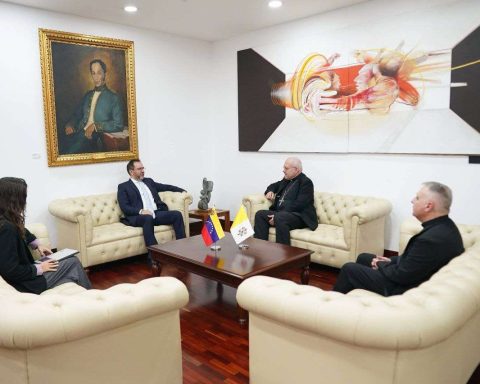Gustavo Lagos Cruz-Coke has all the credentials to be defined as a visionary. In the late 1970s he completed his PhD in Electrochemistry at the University of Leeds and joined the team of scientists – led by M. Stanley Whittingham – that discovered the first lithium intercalation cathode in that decade. The cornerstone of an investigation that led Whittingham, together with John B. Goodenough and Akira Yoshino, to obtain the Nobel Prize in Chemistry 40 years later, in 2019, for the development of the lithium-ion battery.
In 1986, Lagos Cruz-Coke published the book Lithium, a new resource for Chile, and shortly before the beginning of the 1990s, it unsuccessfully tried to obtain financing to develop batteries for electric buses in Santiago. He took up the issue of lithium in the 2000s, and then two years before the battery pioneers won the Nobel Prize, he published his second book on the subject, titled The development of lithium in Chile: 1984-2017.
Being one of the great experts in the field, a little over a month ago he was invited to present his proposal on lithium to the Mining Commission of the Senate, an opportunity in which, in addition to parliamentarians, the Minister of Mining, Marcela Hernando, and the highest representatives of SQM, Albemarle, Atacameño towns and the Autonomous Fiscal Council. He acknowledges, without false modesty, that several of his points were also part of the general guidelines that President Gabriel Boric announced last night, when he presented –on national television– his National Lithium Strategy.
-How do you evaluate the announcements made by the President regarding lithium?
-In the first place, it seems intelligent to me that the President has spoken about the National Lithium Strategy and not about the National Lithium Policy, because the national policy only occurs when there is a majority agreement and that is not yet. Let’s see what the reaction will be to this speech and this proposal. But the important thing about a national strategy is that it does not apply only to this government, but rather that it has a long-term vision of the future, for whose approval we need political transversality, something that the President also mentioned in his speech. I emphasize that this strategy will be successful as long as the necessary political agreements are reached.
-One of the central proposals is to put Codelco at the forefront of public-private negotiations. How do you appreciate this role in your relationship with SQM, which has the exploitation rights in the Atacama salt flat until 2030?
-That seems very good to me. In fact, I proposed this in the Senate before the Mining Commission, so that Codelco would lead the negotiations to see what happens with SQM and SQM’s concessions in the future. This does not mean that we put a straitjacket on it and tell Codelco that it has to have a majority or a minority, or anything. We say ‘OK, explore the best possibilities, because you have all the conditions to be able to do this properly’. It has a project evaluation department, it knows about exploration, it has a legal department, it has international operations and, therefore, it can perform perfectly in evaluating the best conditions to exploit the Atacama salt flat. But one thing must be clear, there has to be a tender, because one cannot assign by finger, even Codelco could not assign by finger what the conditions will be. These conditions have to be tendered internationally, and the conditions of that tender have to be very well studied before making the tender. And the winner can be SQM or it can be another company. And of course the State will be present. In what conditions will it be present? That is another issue.
– Regarding the same, the President announced that the backbone of the strategy is that the State be the one that has control in the figure of 50+1.
-There is an aspect in which I would like to see the text to be able to give an opinion. Because he talks about the State having more than 50% of the property. But I don’t know what exactly it refers to, if it refers to all the projects, if it refers to some of the projects that are going to be tendered or if it refers to some of the projects that are already underway. That was not entirely clear to me and I think it is necessary to see the text. But, in any case, I think that this is going to be the subject of debate because, obviously, imposing on the State that it be more than 50% of the property of the companies that exploit lithium, may not mean the best business for Chile. The objective is not for the State to be the majority, but for Chile to win as much as possible. That is the real goal.
-Why wouldn’t it be the best business for Chile for the State to have control of the property?
-Because, from the start, it is possible that the State does not have the powers to direct an operation that at this moment it certainly cannot direct, because it does not have enough technicians, enough professionals to extract lithium, and refine it and take it to product, export it . And it does not have international offices, which are many, because lithium is sold differently than copper, because it is a very different business from copper. I think we have to let the numbers speak, we have to let the projects be evaluated. And there we have to see what is most convenient for the State of Chile, for the country.
-The President set an ambitious goal, for Chile to become the world leader in lithium exploitation. How do you see that goal knowing that Chile is not the only actor?
-In Chile we are literally sitting on a gold mine, because we have the two most important metals in the fight against climate change and it turns out that we have the largest reserves of both. We have to take advantage of it. There is a long way to go, if we put in the resources and do things right, I believe that Chile can do very well. The goal that the President has set for himself is high, of course, but there is the possibility of achieving it, because we have the financial resources to do it and because, if we agree on how to do things, we can do it very well. If we don’t agree and we keep fighting in Parliament and in other political circles, of course this is going to be a failure.
-Do you think the strategy is coming on time or a little late? I’m asking because a recent Goldman Sachs report talked about there being a major decline in the price of lithium and that it could probably drop in the future. How timely is this National Lithium Strategy?
-Lithium, like all other metals, has a cyclical price, it has high and low cycles, and that is not going to change, there will be high and low cycles in the future. And the long-term price with which the projects are currently being evaluated is in the order of between 15 and 20 thousand dollars per ton of lithium carbonate, understanding that the historical price has been much lower. Therefore, it is a huge opportunity for Chile. We are not going to have the giant price that we had in 2022, which was three or four times more than that, we are not going to have it possibly for the whole time, but maybe in some periods, yes. When the supply decreases, the price is going to be much higher. Therefore, I would say no, Chile has not lost opportunities that are irrecoverable, because there are still 20, 30 years left to reach 2050, which is the year that is proposed to reach carbon neutrality. And therefore lithium is one of the two metals in the world that are most important in the fight against climate change, and the other is copper.
-Along with the creation of the National Lithium Company, a Public Technological and Research Institute of Lithium and Salt Flats will be created, which will be located in Antofagasta. What, do you think, will be the objectives of this institute and the profit in terms of innovation?
-I think that the Research Institute will have many different objectives. Of course, innovation in the processes, but also the sustainability of the salt flats. And, therefore, I believe that there is a great field to exercise there. It will be focused on Antofagasta, which is the main region that has Chile’s lithium reserves and the main region of reserves in the world, actually. So, it’s good that it’s in Antofagasta, but that’s where all the Chilean academics who can, and also international ones, have to participate. This will be an institute that goes far beyond the region, it will be based in the region, it will surely be directed by the region, but it has to open up to the best scientists and technicians in the world, because it will have relatively important resources. , which no other institute in recent years has had. So, it’s an opportunity, it’s an opportunity to do top-level things.
-What do you think of the consideration of incorporating the sustainability of lithium exploitation and the dialogue with the Atacameño communities as a relevant matter?
-That is fundamental, the State has to carry out a project aimed at determining the conditions of sustainable exploitation of the salt flats. That has not been done and it must be done, because no one but the State can do it. Companies cannot do it. Neither can universities. The State has to do it, with the help of all, but the State has to do it. The President spoke about the preservation and conservation of the salt flats, the creation of a network to protect the salt flats is fundamental, because if we do not exploit these salt flats in a sustainable way, it means that we are destroying a source of wealth, which is not only of minerals, but it is also of biodiversity. And as for the communities, of course they have to participate in this strategy. Very centrally, we cannot do projects that are against the community, we have to integrate them into each one of the projects, in such a way that these are done with their full participation and also contributing to the way of life of those communities. .

















